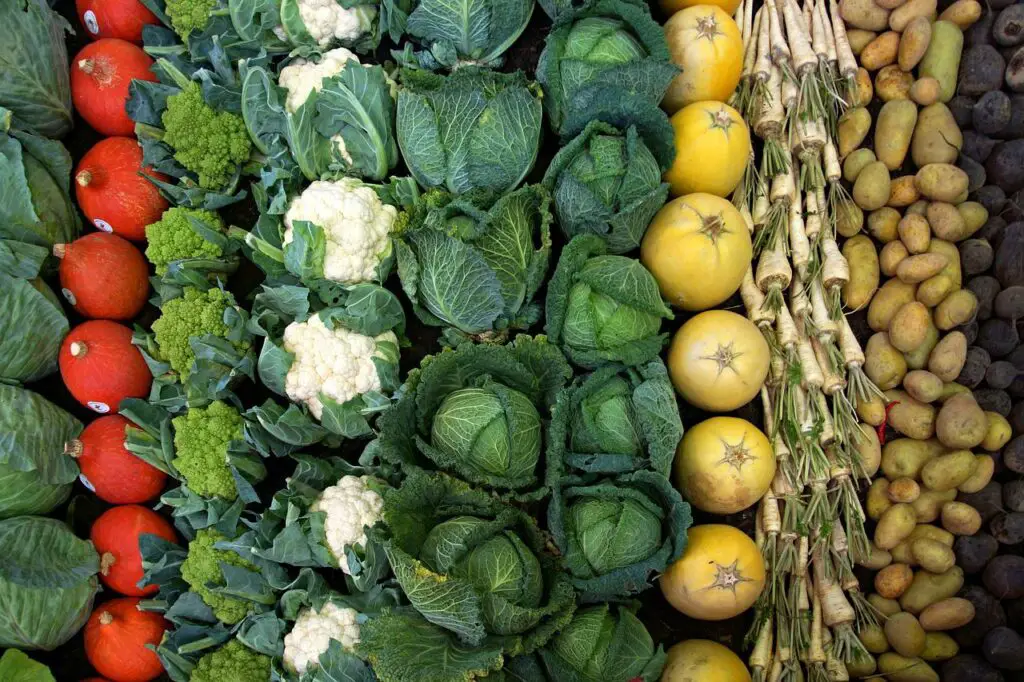Brocolli and cauliflower are excellent sources of minerals and nutrients.
These vegetables are a wholesome addition to your meal.
However, you may often wonder if your dog can enjoy the same benefits.
So, can dogs eat broccoli and cauliflower?
Yes.
Dogs can enjoy unseasoned cooked broccoli and cauliflower in moderation.
These vegetables are rich sources of vitamins, calories, fiber, and oxidants that boost your canine’s immune system and overall health.
Here’s what you need to know about broccoli and cauliflower, the benefits to your dog, and some sample recipes to try.

Benefits of broccoli and cauliflower for your dog
Cauliflower and broccoli are cruciferous vegetables that are classified alongside cabbage, bok choy, kale, and radishes, among others.
Health benefits of cauliflower
Choline: This nutrient boosts heart health, brain development, the nervous system, liver, and muscle functions.
Antioxidants: Cauliflower is rich in antioxidants that fight toxins and promote good health in your canine.
Fiber: It’s also rich in fiber which is excellent for your dog’s digestive system.
Fiber helps in digestion and reduces constipation and diarrhea.
Beta-carotene: This nutrient is an antioxidant that helps prevent diseases and infections in your dog.
Beta-carotene helps improve your canine’s skin and fur.
It further promotes bone development, eye, and reproductive health.
Folates: Folic acid boosts tissue growth, immune functions, blood formation, and cell division.
Vitamin A& C: These vitamins promote proper growth, cell function, and immune functions in your canine.
Minerals: Calcium, manganese, potassium, and magnesium are essential minerals found in cauliflower that are good for your dog.
They promote fluid balance, bone development, cell and muscle functions.
Health benefits of broccoli
Fiber: Broccoli is rich in fiber which aids your dog’s digestive system.
Folic acid: This nutrient is essential for your pup’s blood cell production and DNA synthesis.
Minerals: Broccoli also contains chromium, potassium, magnesium, and sodium, which work together to maintain a healthy immune and nervous system.
Vitamin C & K: Vitamin C has anti-inflammatory qualities and supports your furry friend’s immune system.
Vitamin K promotes bone health by increasing density.

Similarities and differences between broccoli and cauliflower
Broccoli and cauliflower are good additions to your dog’s diet.
They should, however, be served in moderation.
These highly nutritious vegetables have several similarities and differences.
Similarities
- Broccoli and cauliflower are the same vegetable category, including kale, cabbage, and Brussel sprouts.
- They are prepared the same way, separate or together, by steaming, stir-frying, roasting, or baked.
Differences
- A glaring difference is color. Broccoli is green, while cauliflower is white.
- Broccoli has a mildly bitter taste, while cauliflower is sweeter.
- The edible part in cauliflower is the head, while in broccoli, it’s the flower bud.
- There are three kinds of broccoli, sprouting broccoli, calabrese broccoli, and purple cauliflower, while Nothern European annual, Northern European biennial, Asian and Italian cauliflowers are the commonly found varieties.
- Broccoli has more nutrients and minerals than cauliflower.
How to safely feed broccoli and cauliflower to your dog
Cauliflower and broccoli are human foods that you should prepare in a certain way to ensure your fur buddy’s safety.
Here are a few guidelines:
Cooked is better than raw
It’s best to cook your broccoli and cauliflower before feeding them to your dog.
The raw vegetables are somewhat chewy and, to be honest, don’t taste that great when uncooked.
Steaming or boiling the vegetables makes them more digestible.
You can also blend, producing a puree. Mix the puree in your canine’s food to get more nutritional value.
Cut-up is better than chunks
Cut-up or sliced pieces of broccoli and cauliflower are safer to feed your dog than chunks and stalks, which pose a choking hazard.
Bite-sized pieces are safer, and your furry friend won’t struggle as they eat.
Moderation is key
It’s best to feed your dog broccoli and cauliflower in small portions.
Too many vegetables can cause stomach problems like abdominal pain, gas, nausea, and diarrhea.
When introducing the new dish to your canine, start with small portions so that you can assess if they react negatively.
Plain is best
Avoid seasoning, spices, and salt in your canine’s broccoli and cauliflower.
Some of these condiments are toxic to your dog and can have drastic side effects.
Also, avoid oil and butter.
Steaming or boiling is much healthier.
Sample cauliflower and broccoli recipe
Ingredients
- One kilogram of ground chicken
- 16 ounces of diced carrots, broccoli, and cauliflower
- Six cups of water
- Two cups of brown rice
Directions
- Put the water, ground chicken, and rice in a large pot and bring to a boil.
- Stir until the ground chicken is evenly distributed.
- Boil over high heat, and let it simmer for 20 minutes.
- Add the prepared carrots, broccoli, and cauliflower and cook for five more minutes.
- Remove from heat and allow to cool.
Storage
After serving your furry friend his porting for the day, store the remaining food in an airtight container and refrigerate.
The food can last up to two weeks in the fridge and two months in the freezer.
Frequently asked questions
Broccoli and cauliflower: Are they toxic to dogs?
Too much broccoli and cauliflower aren’t toxic to your dog.
However, the high fiber in the vegetables can cause your furry friend digestive issues, thus the need to feed in moderation.
What should I do if my dog overeats broccoli and cauliflower?
Too much broccoli and cauliflower may cause flatulence and stomach pain in your canine due to the high fiber.
You can sprinkle some ginger in your dog’s food to relieve the discomfort.
Also, try feeding your fur buddy some plain natural yogurt or add a few drops of peppermint oil to the drinking water.
If symptoms persist, visit your veterinarian.
Can I add coconut oil to my dog’s vegetables?
Coconut oil is an excellent addition to your dog’s vegetables.
It’s a healthy saturated fat and also rich in fatty acids.
Conclusion
You now don’t have to worry every time broccoli and cauliflower are on the menu, and your kids keep passing the vegetables to the house pet under the table.
Though human food should not replace regular dog meals, broccoli and cauliflower highly complement the diet due to their nutrient richness.
- What Dog Breeds Have Pink Skin? - March 24, 2023
- What Are the Most Inspiring Dog Breeding Quotes? - March 20, 2023
- Can Pheromone Spray Help Improve Dog Breeding Results? - March 19, 2023








